 Your new post is loading...
 Your new post is loading...

|
Scooped by
Gust MEES
|
Researchers in Luxembourg have uncovered a new approach for shrinking tumours. Their findings, recently published in the Molecular Oncology Journal, outlines a potent immunotherapy combination. This combination involves pairing a STING agonist, which enhances the immune system, with a compound that targets autophagy, a mechanism implicated in cancer immune evasion. This dual therapeutic approach markedly reduced tumour size and improved survival rates in preclinical studies, offering new hope of shifting the paradigm in cancer treatment. Learn more / En savoir plus / Mehr erfahren: https://www.scoop.it/t/luxembourg-europe/?&tag=Health https://www.scoop.it/topic/luxembourg-europe/?&tag=Cancer

|
Scooped by
Gust MEES
|
Spender, an denen Hundehalter eine kostenlose Tüte ziehen können, um die Notdurft ihres Tieres beseitigen zu können, gehören längst zum Alltag. Mit der Ankunft des Coronavirus wurden auch immer mehr Desinfektionsmittel-Spender im öffentlichen Raum installiert. Nun gibt es im Großherzogtum auch Sonnencreme gratis. Aufgestellt hat sie die «Fondation Cancer» im ganzen Land.
Insgesamt zehn dieser Ausgabestellen für Sonnencreme mit dem Lichtschutzfaktor 50 gibt es mittlerweile. Zu finden sind sie in Weiswampach, Grevenmacher, Remich, Remerschen, Differdingen, am Obersauer-Stausee – und auch in Hesperingen, wo der Spender am Freitagmorgen offiziell eingeweiht wurde. Das Wetter bot die perfekte Kulisse für die Vorstellung des Geräts, das auch die Intensität der gegenwärtigen UV-Strahlung anzeigt. Learn more / En savoir plus / Mehr erfahren: https://www.scoop.it/t/luxembourg-europe/?&tag=Cancer

|
Scooped by
Gust MEES
|

|
Scooped by
Gust MEES
|
A team of researchers from the Luxembourg Institute of Health (LIH) has made a discovery about the defence strategies of breast cancer cells against the body's immune system.
Tumour cells can develop multiple strategies to protect themselves from the attacks of the immune system, which seeks to eliminate them. LIH researchers thus studied the defence strategies of breast cancer cells against so-called natural killer (NK) immune cells, discovering that some cancer cells are able to deploy a molecular shield that protects them from immune cells.
The NK cells, found in the immune system, can detect the abnormal characteristics of cancer cells by coming into contact with them and can release toxic substances to destroy them. In general, this attack kills cancer cells effectively and quickly. To ensure their survival and growth of the tumour, however, cancer cells are able to develop ingenious strategies to inhibit the immune system's reactions. These are the mechanisms that the team of Dr. Clément Thomas at LIH has tried to better understand to develop new therapeutic approaches for the treatment of cancer. Learn more / En savoir plus / Mehr erfahren: https://www.scoop.it/t/luxembourg-europe/?&tag=Research https://www.scoop.it/t/luxembourg-europe/?&tag=LIH https://www.scoop.it/t/luxembourg-europe/?&tag=Cancer

|
Scooped by
Gust MEES
|
Researchers from the University of Luxembourg found a new biomarker for colorectal cancer (CRC) that might improve therapy and survival rates of patients.
Biomarkers are measurable biological indicators for a specific disease, such as changes in the amounts of certain proteins that occur in combination with certain illnesses. Such biomarkers help physicians to diagnose a condition, identify the disease stage, and determine a patient’s risk for recurrence of the disease. This supports the doctor in choosing the best-fitting treatment plan.
Improved early diagnosis
For CRC, early detection and classification is especially important, as, for example, not all Stage II patients benefit from chemotherapy. Especially identifying patients at risk for recurrence during the early course of the disease might help clinicians. However, there are still too few prognostic markers for CRC known so that too many patients still suffer needlessly from side effects of the chemotherapy without having real benefits. Learn more / En savoir plus / Mehr erfahren: https://www.scoop.it/t/luxembourg-europe/?&tag=University+Luxembourg https://www.scoop.it/t/luxembourg-europe/?&tag=Cancer

|
Scooped by
Gust MEES
|
On Tuesday 10 October 2017, Omega 90 asbl created, together with six geriatric institutions, the "Netzwierk Palliativ Geriatrie Lëtzebuerg". The main aim of this network is to promote the geriatric and palliative culture in Luxembourg by cultivating exchanges between the institutions concerned, informing professionals, residents of institutions and the general public on the topics of palliative geriatrics, research and motivating other institutions to join this initiative. Palliative geriatrics aims to enable residents of geriatric institutions to have the best possible quality of life from the time they enter the institution and until their death. This implies, on the one hand, probing and respecting the will of the residents and their entourage, and, on the other hand, close collaboration between all the employees of the institution, all professions combined. Learn more / En savoir plus / Mehr erfahren: http://www.scoop.it/t/21st-century-innovative-technologies-and-developments/?tag=Cancer http://www.scoop.it/t/luxembourg-europe/?tag=Cancer

|
Scooped by
Gust MEES
|
Palliativpflege: Die Patientenverfügung
Die Patientenverfügung ist ein schriftlich verfasstes Dokument, in dem Sie im Voraus festhalten, wie Ihre medizinische Behandlung und Pflege aussehen soll, wenn Sie nicht in der Lage sein sollten, diese zu äußern oder Entscheidungen für sich selbst zu treffen.
Abgesehen von Unterschrift und Datum gibt es keine speziellen Formvorgaben, wie Ihre Patientenverfügung aussehen muss. Sie können das Dokument auf Ihre ganz persönliche Art und Weise gestalten, mit den Inhalten, die Sie als notwendig erachten. Sie können Sie sogar auch in Form eines Briefes verfassen.
Generell geht es in der Patientenverfügung um die folgenden zwei Aspekte: die Behandlung des Patienten und die Linderung der Schmerzen. Sie können Ihre Ablehnung gegen Maßnahmen zum Ausdruck bringen, bei denen es sich Ihrer Ansicht nach um Lebensverlängerung um jeden Preis handelt. Auch Ihre Sicht zum Thema Schmerzlinderung können Sie in der Patientenverfügung darlegen. Nehmen Sie bei Medikamenten gegen Schmerzen beispielsweise in Kauf, dass die Dosis so hoch ist, dass die Nebenwirkungen lebensverkürzend sein können? Oder soll das medizinische Personal die Medikamente nur begrenzt einsetzen?
Klicken Sie hier, um mehr über die Patientverfügung zu erfahren.
Für diejenigen, die ein Formular bevorzugen, haben wir eine einfache und verständliche Mustervorlage ausgearbeitet. Diese enthält Ihre persönlichen Daten und 4 Optionen zum Ankreuzen, die wir als relevant einstufen. Klicken Sie hier, um das Formular downzuloaden: http://www.cancer.lu/sites/cancer/files/files/IC74_Formular_Patientenverfuegung.pdf

|
Scooped by
Gust MEES
|
Scientists at the Luxembourg Institute of Health (LIH) have discovered a previously unknown molecular mechanism that promotes activation of the human immune system, opening a door to new strategies for targeting cancer and autoimmune diseases.
The team, led by Professor Dirk Brenner, fellow and head of the Experimental & Molecular Immunology research group, has been studying the glutathione molecule, produced among others by a particular type of white blood cells named T-cells and known for its role in cleaning the body from harmful metabolic wastes. Their research project revealed that glutathione also stimulates T-cells’ metabolic energy. Learn more / En savoir plus / Mehr erfahren: http://www.scoop.it/t/luxembourg-europe/?&tag=Research

|
Scooped by
Gust MEES
|
Wenn nützliche Darmbakterien zu wenig Ballaststoffe bekommen, fangen sie an, ihren Wirt von innen aufzufressen. Das zeigt eine neue Studie des LIH.
Es gilt als allgemein anerkannt, dass Ballaststoffe zu einer gesunden Ernährung dazugehören. Früher haben die Menschen davon auch reichlich gegessen, bis zu 100 Gramm pro Tag. In den letzten Jahrzehnten hat sich dieser Anteil allerdings auf dramatische Weise verringert. Was vor allem daran liegt, dass wir mehr Fertigprodukte zu uns nehmen und sich unser Lebensstil verändert hat.
Als Folge ist eine Zunahme von entzündlichen Darmerkrankungen, Darmkrebs und anderen Erkrankungen des Verdauungstraktes zu beobachten. Doch woran liegt das?
Bakterien greifen Darmschleimhaut an
Um diese Frage zu beantworten, führten Dr. Desai , Leiter der Arbeitsgruppe für Öko-Immunologie und Mikrobiomforschung am Luxembourg Institute of Health (LIH) und Dr. Eric Martens von der medizinischen Fakultät der Universität Michigan in den USA eine Studie durch. Eine Studie, die die Funktionen des menschlichen Verdauungstraktes simulierte, indem die Wissenschaftler Mäuse untersuchten, die ohne eigene Darmmikroben geboren und aufgezogen wurden. Diesen sogenannten gnotobiotischen Mäusen wurde ein Transplantat mit einem Cocktail aus 14 Bakterien eingesetzt, die normalerweise im gesunden menschlichen Verdauungstrakt vorkommen.
Danach wurden die Aktivitäten der Bakterien im Zeitverlauf beobachtet. Diese Versuche erlauben den Forschern das Benehmen bestimmter Bakterien in einem lebenden Organismus unter kontrollierten Bedingungen zu untersuchen. Learn more / En savoir plus / Mehr erfahren: http://www.scoop.it/t/luxembourg-europe/?tag=Research

|
Scooped by
Gust MEES
|
Pour ce numéro de rentrée, j’ai opté pour un sujet important et marquant : comment vivre avec un cancer ? Chaque année, environ 2 400 femmes et hommes sont diagnostiqués avec un cancer. Mon équipe et moi-même œuvrons constamment afin de répondre au mieux à ces personnes tout au long de leur parcours. Du diagnostic à la rémission en passant par l’amélioration du quotidien, ces sujets sont abordés sans tabou dans cette édition. Et très prochainement la version exhaustive sera publiée sous forme d’une brochure. Learn more / En savoir plus / Mehr erfahren: http://www.scoop.it/t/21st-century-innovative-technologies-and-developments/?tag=Cancer

|
Scooped by
Gust MEES
|
Ce 25 juin 2015, l'Institut National du Cancer a été créé sous la forme d'une Asbl, dont les membres fondateurs sont: le Centre Hospitalier de Luxembourg, le Centre Hospitalier Emile Mayrisch, les Hôpitaux Robert Schuman, le Centre Hospitalier du Nord, le Centre François Baclesse, la Société Luxembourgeoise d’Oncologie, la Fondation Cancer, la Fondatioun Kriibskrank Kanner, la Patiente Vertriedung, ainsi qu’un membre désigné de la Plateforme Nationale Cancer et le Médiateur de la Santé.
La Présidence est assurée par le Docteur Guy Berchem, médecin spécialiste en oncologie médicale et la Vice-Présidence par le Docteur Marc Berna, médecin spécialiste en médecine interne. Le Docteur Michel Untereiner, médecin spécialiste en radiothérapie en est le Secrétaire et Madame Anne Goeres la trésorière.
En savoir plus / Mehr erfahren / Learn more:
- http://www.scoop.it/t/21st-century-innovative-technologies-and-developments/?tag=Cancer

|
Scooped by
Gust MEES
|

|
Scooped by
Gust MEES
|
Université du Luxembourg
Le cancer du foie (« carcinome hépatocellulaire » ou CHC), avec ses quelque 750 000 nouveaux cas par an, représente la cinquième tumeur maligne la plus répandue au monde. Il est de plus en plus fréquent en Europe, les hommes étant deux à trois fois plus touchés que les femmes.
L’apparition du carcinome hépatocellulaire est souvent liée à une inflammation chronique du foie. Les virus de l’hépatite B et C augmentent considérablement le risque de développer ce type de carcinome. Des facteurs nutritionnels favorisent également les inflammations du foie. Les causes les plus fréquentes sont l’obésité, le diabète de type 2 et la fibrose hépatique, c’est-à-dire une cicatrisation du tissu hépatique résultant par exemple d’infections virales chroniques ou d’une consommation d’alcool trop importante.
|

|
Scooped by
Gust MEES
|
C'est la deuxième forme de cancer la plus répandue au Luxembourg, chez les hommes comme chez les femmes, dont la détection rapide peut améliorer l'efficacité du traitement.
C'est pour cette raison que depuis dix ans, l'Université du Luxembourg a lancé des recherches scientifiques dans ce domaine, notamment en collaboration avec la Biobank, la Fondation Cancer ou encore le Fonds National de la Recherche.
Les biomarqueurs sont les indicateurs biologiques de maladies bien précises. Ils attirent l'attention sur les modifications de certaines protéines qui apparaissent lors de ces maladies, mais jusqu'à présent, aucun biomarqueur n'était connu pour ce type de cancer.
Ces dernières années, des chercheurs de l'Université du Luxembourg ont réussi à découvrir un nouveau biomarqueur très prometteur pour le cancer de l'intestin. Ces indicateurs permettraient, surtout à un stade précoce de la maladie, de classer les patients en groupes selon leur degré de risque, "élevé" ou "faible". Une telle classification pourrait aider le docteur à prescrire le traitement le plus adapté au patient. Learn more / En savoir plus / Mehr erfahren: https://www.scoop.it/t/luxembourg-europe/?&tag=Health https://www.scoop.it/topic/luxembourg-europe/?&tag=Cancer

|
Scooped by
Gust MEES
|
Das Unkrautvernichtungsmittel Glyphosat wird ab dem 1. Januar 2021 in Luxemburg komplett verboten. Das teilte das Landwirtschaftsministerium am Donnerstagmorgen mit. Laut Landwirtschaftsminister Romain Schneider (LSAP) wird das Großherzogtum damit zum „Vorreiter in der Europäischen Union“.
Die Benutzung des Unkrautvernichtungsmittels Glyphosat wird ab dem 1. Januar nächsten Jahres in Luxemburg verboten sein. Landwirtschaftsminister Romain Schneider (LSAP) kündigte am Donnerstagmorgen in einer Pressekonferenz an, dass das Großherzogtum damit „eine Vorreiterposition innerhalb der EU“ einnehmen werde. Aktuell werden in Luxemburg 13,6 Tonnen des Mittels jährlich verwendet.
Bereits dieses Jahr soll der Verkauf des Mittels schrittweise zurückgeschraubt werden. Landwirte, die bereits vor dem kompletten Verbot auf das Produkt verzichten, werden finanziell vom Staat unterstützt. Auch zukünftig sollen finanzielle Hilfen angeboten werden, die den Kauf von Maschinen erleichtern sollen, die zum Beseitigen des Unkrauts eingesetzt werden. „Wir sind positiv von den Reaktionen der Landwirte überrascht“, sagte Minister Romain Schneider am Donnerstag während der Pressekonferenz. „Mit diesem Schritt wird die Landwirtschaft in Luxemburg ab nächstem Jahr nachhaltiger werden. Learn more / En savoir plus / Mehr erfahren: https://www.scoop.it/topic/luxembourg-europe/?&tag=Glyphosate https://www.scoop.it/topic/luxembourg-europe https://www.scoop.it/topic/luxembourg-europe/?&tag=Agriculture

|
Scooped by
Gust MEES
|
On Friday, the Luxembourg Cabinet approved the second National Cancer Plan 2020-24 (PNC2), the main priority of which is the digitalisation, implementation and compatibility of computerisation at all levels.
According to the Ministry of Health, this priority will have a positive impact on the healthcare system in general by improving the flow of information and data between specialists and the different institutions involved in patient care, healthcare management and epidemiological and clinical research.
The modernisation of computer systems in the country is also aimed at supporting the implementation of modern genetics and molecular pathology through the development of the national centre for human genetics and its hospital and medical collaboration. Access to innovation in this area is a second priority for this PNC2 and aims to improve the quality of care provided. Learn more / En savoir plus / Mehr erfahren: https://www.scoop.it/t/luxembourg-europe/?&tag=Health https://www.scoop.it/topic/luxembourg-europe/?&tag=Cancer

|
Scooped by
Gust MEES
|
LIH-Forscher-Team liefert Belege für bislang unbekannte Abwehrstrategie von Brustkrebs
Hoffnung auf neue Ansatzpunkte für die medikamentöse Krebsbehandlung: Forscher des Luxembourg Institute of Health (LIH) haben Abwehrstrategien aufgedeckt, mit denen sich Brustkrebs-Zellen vor den sogenannten natürlichen Killerzellen des Immunsystems schützen.
Wenn Wächterzellen des menschlichen Körpers im Normalfall auf die Tumorzellen treffen, sondern sie Stoffe ab, um die Tumorzellen schnell und effektiv zu zerstören. Diese natürlichen Killerzellen sind Bestandteil des Immunsystems und sprechen auf bestimmte Merkmale der „entarteten“ Zellen an, wenn sie mit ihnen in Kontakt treten. Die Killerzellen geben giftige Substanzen ab, um die Krebszellen zu zerstören, wie das LIH ausführt. Learn more / En savoir plus / Mehr erfahren: https://www.scoop.it/t/luxembourg-europe/?&tag=Research https://www.scoop.it/t/luxembourg-europe/?&tag=LIH https://www.scoop.it/t/luxembourg-europe/?&tag=Cancer

|
Scooped by
Gust MEES
|
In Luxemburg ist Darmkrebs die zweithäufigste Krebserkrankung bei Männern und Frauen (weitere Informationen hier). Pro Jahr erkranken zirka 284 Personen, ungefähr 124 Menschen sterben an den Folgen. Bei Darmkrebs ist es besonders wichtig, die Krankheit frühzeitig zu erkennen, da eine Behandlung in einem späten Stadium deutlich weniger Erfolg versprechend ist. Insbesondere Patienten mit einem Risiko für ein Wiederauftreten der Krankheit zu erkennen, könnte für die Ärzte von großem Nutzen sein.
In dieser Hinsicht ist Forschern der Universität Luxemburg jetzt ein wichtiger Durchbruch gelungen: Sie haben einen neuen “Biomarker” für Dickdarmkrebs gefunden, der die Therapie und die Überlebenschancen von Patienten verbessern könnte. Das teilt die Universität heute mit.
Wichtiger Schritt: Bisher nur wenige Biomarker bekannt
Biomarker sind biologische Indikatoren für eine bestimmte Krankheit. Sie deuten etwa auf Veränderungen bestimmter Proteine hin, welche bei verschiedenen Krankheiten auftreten. Das erleichtert es dem Arzt, das am besten geeignete Therapiekonzept auszuwählen. Allerdings sind bisher nur wenige prognostische Marker für Darmkrebs bekannt, sodass zu viele Patienten immer noch unter den Nebenwirkungen der Chemotherapie leiden, ohne einen tatsächlichen Nutzen zu haben. Learn more / En savoir plus / Mehr erfahren: https://www.scoop.it/t/luxembourg-europe/?&tag=Research https://www.scoop.it/t/luxembourg-europe/?&tag=Cancer

|
Scooped by
Gust MEES
|
Euthanasie: Bestimmungen zum Lebensende
Die Bestimmungen zum Lebensende ('Dispositions de fin de vie') sind ein Antrag auf aktive Sterbehilfe, der im Voraus schriftlich festgehalten wird für den Fall, dass der Antragsteller sich zu einem späteren Zeitpunkt nach dem aktuellen Stand der Wissenschaft in einem Zustand unumkehrbarer Bewusstlosigkeit befindet.
Die folgenden drei Bedingungen müssen erfüllt sein: Bewusstlosigkeit, Unumkehrbarkeit der Situation und Unheilbarkeit.
Falls Sie Bestimmungen zum Lebensende verfassen, muss das Dokument bestimmte Elemente erhalten, wie Datum und Unterschrift.
Jede volljährige Person, die dazu in der Lage ist, kann schriftlich die Umstände und Bedingungen festlegen, unter denen sie aktive Sterbehilfe erhalten möchte.
Klicken Sie hier, um mehr über die Bestimmungen zum Lebensende zu erfahren. Hier klicken, um das Formular downzuloaden. http://www.cancer.lu//sites/cancer/files/files/IC74_Formular_Bestimmungen-Lebensende.pdf
Die Registrierung der Bestimmungen zum Lebensende bei der 'Commission Nationale de Contrôle et d’Evaluation' ist obligatorisch. Das Dokument muss an folgende Adresse gesendet werden:

|
Scooped by
Gust MEES
|

|
Scooped by
Gust MEES
|
The Cancer Foundation Luxembourg is launching a new information brochure titled During and after — How to Live with Cancer to mark World Day Against Cancer on 4 February.
Using plain language, the brochure brings together suggestions and practical advice from oncologists and psychologists aimed at addressing the questions and fears of those who have just been diagnosed with cancer and those who are living with it.
According to The Cancer Foundation, this is the first time such a guide has been published in Luxembourg.
The brochure is available free of charge in French and German and can be downloaded in PDF format from The Cancer Foundation website. Learn more / En savoir plus / Mehr erfahren: http://www.scoop.it/t/21st-century-innovative-technologies-and-developments/?tag=Cancer http://www.scoop.it/t/luxembourg-europe/?tag=Cancer

|
Scooped by
Gust MEES
|
Programme de dépistage organisé du cancer colorectal (PDOCCR)
Lors d’une conférence de presse qui s’est tenue le 16 septembre 2016, la ministre de la Santé Lydia Mutsch a présenté le nouveau programme de dépistage organisé du cancer colorectal (PDOCCR). Avec ce programme, le Luxembourg a rejoint tous les autres pays européens dans la lutte contre le cancer colorectal.
« Grâce à ce nouveau programme, chaque citoyen âgé entre 55 et 74 ans aura droit à un dépistage de haute qualité, dont les indicateurs sont régulièrement enregistrés, évalués et publiés. De cette façon, une prise en charge cohérente et multidisciplinaire des personnes touchées pourra être garantie», a souligné la ministre.
Objectifs du programme de dépistage
Les objectifs du programme de dépistage sont les suivants:
Réduire la mortalité par cancer colorectal,
Détecter précocement le cancer colorectal afin d’épargner aux patients des traitements pénibles dans la mesure du possible,
Prévenir les cancers en enlevant les polypes.
« De plus, l’objectif est de maintenir le chiffre actuel de 30% de la population cible réalisant une coloscopie et de permettre aux personnes ne participant à aucun dépistage du cancer colorectal d’accéder à une détection grâce à un test simple », a encore expliqué la ministre.
Population concernée
Pour participer au programme de dépistage, il faut:
être âgé(e)s entre 55 et 74 ans inclus,
être assuré(e)s auprès de la Caisse Nationale de Santé,
résider au Luxembourg.
Si vous faites partie de cette population, vous recevrez par courrier en 2016 ou 2017 une lettre d’invitation et un test de dépistage.
Il s'agit du test OC Sensor®. Ce test est simple et efficace. Il permet de repérer un saignement intestinal et détecte une infime quantité de sang. Il consiste à faire 1 seul prélèvement de selles à domicile.
Learn more / En savoir plus / Mehr erfahren: http://www.scoop.it/t/21st-century-innovative-technologies-and-developments/?tag=Cancer http://www.scoop.it/t/luxembourg-europe/?tag=Cancer

|
Scooped by
Gust MEES
|

|
Scooped by
Gust MEES
|
L’implantation du Plan national cancer avance à grands pas. Le ministère de la Santé prévoit d'établir un réseau national d'hématologie et d'oncologie pédiatrique, pour aider encore un peu plus ces enfants et leurs familles.

|
Scooped by
Gust MEES
|
Le 4 février c'est la Journée mondiale de lutte contre le cancer. Une journée placée cette année sous le signe des mythes qui circulent. Du genre: pas la peine d'en parler, on ne peut rien faire contre, etc...
|



 Your new post is loading...
Your new post is loading...





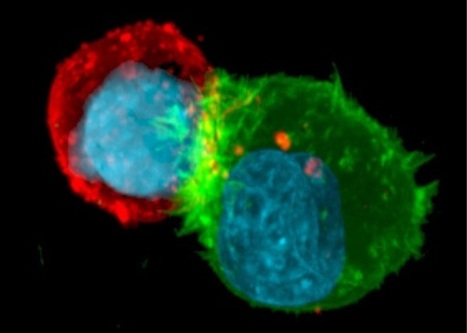
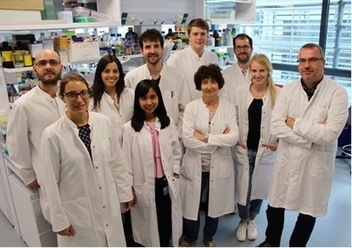
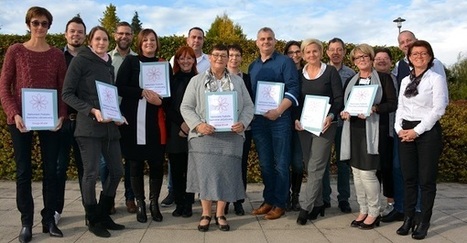



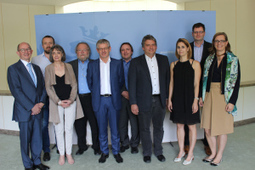


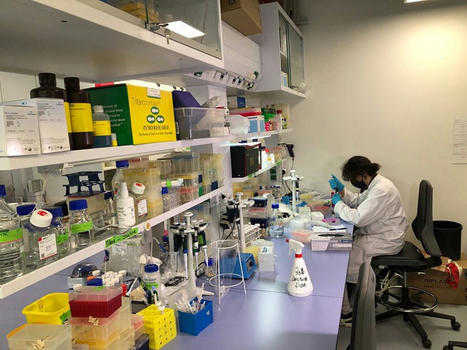



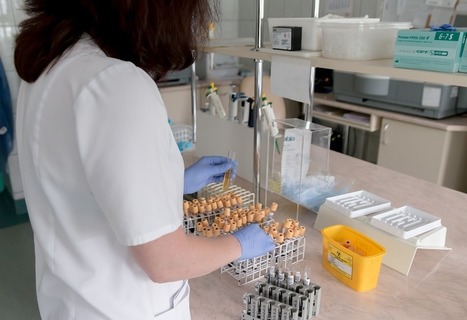
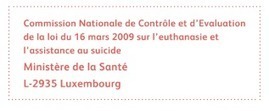










Researchers in Luxembourg have uncovered a new approach for shrinking tumours. Their findings, recently published in the Molecular Oncology Journal, outlines a potent immunotherapy combination. This combination involves pairing a STING agonist, which enhances the immune system, with a compound that targets autophagy, a mechanism implicated in cancer immune evasion. This dual therapeutic approach markedly reduced tumour size and improved survival rates in preclinical studies, offering new hope of shifting the paradigm in cancer treatment.
Learn more / En savoir plus / Mehr erfahren:
https://www.scoop.it/t/luxembourg-europe/?&tag=Health
https://www.scoop.it/topic/luxembourg-europe/?&tag=Cancer